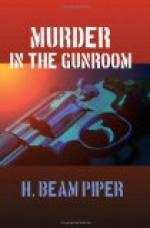“Arnold Rivers,” Rand said, when it was evident that she was not going to continue, “has the reputation, among collectors, of being the biggest crook in the old-gun racket, a reputation he seems determined to live up—or down—to. But here; if your stepdaughters are co-owners, what’s my status? What authority, if any, have I to do any negotiating?”
Gladys Fleming laughed musically. “That, my dear Colonel, is where you earn your fee,” she told him. “Actually, it won’t be as hard as it looks. If Nelda gives you any argument, you can count on Geraldine to take your side as a matter of principle; if Geraldine objects first, Nelda will help you steam-roll her into line. Fred Dunmore is accustomed to dealing with a lot of yes-men at the plant; you shouldn’t have any trouble shouting him down. Anton Varcek won’t be interested, one way or another; he has what amounts to a pathological phobia about firearms of any sort. And Humphrey Goode, our attorney, who’s executor of the estate, will welcome you with open arms, once he finds out what you want to do. That collection has him talking to himself, already. Look; if you come out to our happy home in the early afternoon, before Fred and Anton get back from the plant, we ought to ram through some sort of agreement with Geraldine and Nelda.”
“You and whoever else sides with me will be a majority,” Rand considered. “Of course, the other one may pull a Gromyko on us, but ... I think I’ll talk to Goode, first.”
“Yes. That would be smart,” Gladys Fleming agreed. “After all, he’s responsible for selling the collection.” She crossed to the desk and sat down in Rand’s chair while she wrote out the check and a short letter of authorization, then she returned to her own seat.
“There’s another thing,” she continued, lighting a fresh cigarette. “Because of the manner of Mr. Fleming’s death, the girls have a horror of the collection almost—but not quite—as strong as their desire to get the best possible price for it.”
“Yes. I’d heard that Mr. Fleming had been killed in a firearms accident, last November,” Rand mentioned.
“It was with one of his collection-pieces,” the widow replied. “One he’d bought just that day; a Confederate-made Colt-type percussion .36 revolver. He’d brought it home with him, simply delighted with it, and started cleaning it at once. He could hardly wait until dinner was over to get back to work on it.
“We’d finished dinner about seven, or a little after. At about half-past, Nelda went out somewhere in the coupe. Anton had gone up to his laboratory, in the attic—he’s one of these fortunates whose work is also his hobby; he’s a biochemist and dietitian—and Lane was in the gunroom, on the second floor, working on his new revolver. Fred Dunmore was having a bath, and Geraldine and I had taken our coffee into the east parlor. Geraldine put on the radio, and we were listening to it.




